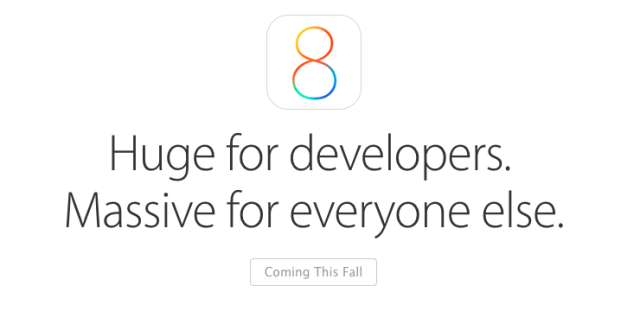
CUPERTINO, CA—Apple has officially announced a release date for iOS 8, the latest version of the operating system that powers iPhones, iPads, and iPod touches. The new software launches on September 17, and as we've written before it will be available on the iPhone 4S, 5, 5C, and 5S; the iPad 2, both Retina iPads, the iPad Air, and both iPad minis; the fifth-generation iPod touch; and all revisions of the third-generation Apple TV.
While iOS 7 was all about a complete, comprehensive visual refresh, iOS 8 focuses more on the underlying components of the operating system. The most important of these are the new Extensions, which will allow third-party applications to do many things they couldn't do before. Third-party applications can now provide widgets for your notification center, share data with other applications, and even edit photos and other documents inline without leaving the application you're working in.iOS has long had a reputation for being more locked down and inflexible than Android, its biggest competitor in the mobile space, but Extensions help to remove many of those barriers. For example, one type of Extension allows for third-party software keyboards, something Android has allowed for a long time. There are still restrictions on what these Extensions can do and how they behave, but it should enable more useful apps and a more customizable user experience.
Not that Apple is leaving all the improvements up to third-parties. Its own keyboard will now include predictive typing suggestions, and certain notifications (like those from the Messages and Calendars apps) will now let you respond directly from the notification center without having to dive into individual apps.
iOS 8 also includes new features that will help it integrate with OS X Yosemite, the redesigned version of the Mac operating system that's due out later this fall—these features collectively fall under the Continuity banner. iPhone users will be able to make and receive phone calls and SMS messages on their Macs and iPads, and you'll be able to pull up an e-mail you're typing on your phone on your iPad or Mac and vice-versa. Most people won't be able to experience these features until they upgrade their Macs to Yosemite, but anyone using the Yosemite Public Beta should be able to get a preview if all their devices are signed into the same iCloud account.The Family Sharing feature is a big one, too: up to five Apple IDs can now belong to the same "family," and family members will be allowed to share app and media purchases without having to pay for them multiple times. Calendars, reminders, photos, and other items can be synced among family members as well, as can Find My Friends location data (with permission). And parents will be able to set it up so that younger family members trying to make purchases will need to get their permission first—these permission requests will come through as notifications that parents can quickly accept or reject.
For users of TouchID-enabled iPhones, Apple will be opening that feature up to third-party developers too. In iOS 7 it could only be used to unlock your phone and authenticate App Store purchases, but third-parties can also use it to authenticate in iOS 8—rumor has it that iPads will be picking up TouchID at some point soon, too, so it's a feature that will get more useful as more hardware picks up the fingerprint sensor.
And a trio of APIs and technologies will help make iOS a hub for even more of your digital stuff: HealthKit, HomeKit, and CloudKit.
HealthKit, along with the new built-in Health app, can aggregate the fitness information collected by compatible apps and fitness sensors into one place and, with your permission, share it with health care professionals. Apple has already published some fairly strict rules surrounding HealthKit apps, mostly to keep data as private as possible—the data can't be used for advertising, developers must have a privacy policy available within the app, and the apps can't store data in iCloud. Laws regarding medical data are pretty stringent, and the App Store rules surrounding HealthKit reflect that reality.
HomeKit is a smaller framework, one that has potential that may not be realized unless connected home gadgets become more popular (and if the manufacturers of those gadgets choose to support HomeKit). HomeKit essentially allows your iOS device to act as a hub for all of your various smart devices, making it easier to control them all from one device. CloudKit is something users may not notice, but developers can use it to lighten their load by providing authentication, database services, and asset storage free-of-cost (at least, until you've used 10TB of database storage or an entire 1PB of asset storage).
Other, smaller changes abound. Siri can now recognize songs playing in the background, courtesy of Shazam. Spotlight can pull in context-sensitive suggestions from other sources, providing you with movie and TV listings and other information based on what you search from. Mail, Safari, and other core apps continue to be refined. A Tips app gives new users advice on how to best use the OS. The iBooks and Podcasts applications are now included by default. The Apple TV is getting a facelift. The list goes on.
We'll be running our full iOS 8 review to give you more details when the software is officially released. Apple's event is ongoing, and we'll continue to update this post with any new details.
reader comments
42